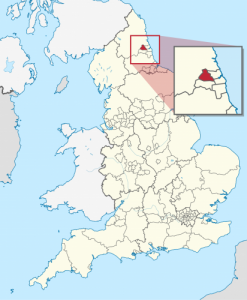By Sarah-Claire Jordan
 Geordie refers to anyone from Newcastle-upon-Tyne in North East England, as well as the dialect of English spoken by the natives there. The Geordie dialect has become more popular in British media, as it tends to sound friendlier and more melodic than other British English dialects. Aside from pronunciation differences, there are many words that are only used in Geordie English. A lot of the vocabulary unique to Geordie is influenced by Scots and Irish English, so if you know either of those languages, you will find it easier to understand the Geordie dialect.
Geordie refers to anyone from Newcastle-upon-Tyne in North East England, as well as the dialect of English spoken by the natives there. The Geordie dialect has become more popular in British media, as it tends to sound friendlier and more melodic than other British English dialects. Aside from pronunciation differences, there are many words that are only used in Geordie English. A lot of the vocabulary unique to Geordie is influenced by Scots and Irish English, so if you know either of those languages, you will find it easier to understand the Geordie dialect.
However, even other English people have trouble understanding Geordie, resulting in Geordie transplants having to soften their accent and replace their particular slang and vocabulary with that of wherever they have settled. Here are five typical Geordie phrases to learn and understand if you want to get an idea of what the Geordie dialect is like:
1. “That’s champion, man”
In Geordie English, the word “champion” becomes an adjective rather than a noun, meaning “great” or “excellent”. This phrase is commonly prefaced with “Eeeh”, which is a Geordie way of adding emphasis to something. The “man” on the end does the same thing, but is not so drawn out like the American “man” we hear a lot. It is quite short and used when talking with anyone, regardless of gender.
2. “Oh, hadaway yi daft bugga”
“Hadaway” means “away with you” and can be used in a friendly way or even an offensive way, depending on the context and what else is said in the phrase. The above phrase is something one would say to a friend if they had said something “daft” or stupid. If combined with the right words, however, it can pack a huge punch.
3. “Why aye man”
“Aye” is Geordie for “yes, and this entire phrase means “Why yes of course.” The “why” is added for emphasis. The “aye” itself is something that survived from Shakespeare’s time, a nod to the Old English that shaped much of what the Geordie dialect is today.
4. “Howay, let’s gan noo”
The first word of this phrase has a few different meanings depending on what it is combined with. The above phrase means “Come on, let’s go now”, but the same “howay” can be used as in “Howay, man” if someone cuts in front of you in line or something else inconsiderate. “Howay the lads” is a popular chant among many Geordie football fans cheering for their favorite team, the Newcastle United Football Club. In that case, the “come on” meaning still rings true.
5. “Gan canny”
On its own, “canny” is an adjective that means “good” or “nice”. Combined with “gan”, meaning “go”, the adjective becomes an adverb meaning “carefully”. The entire phrase could be translated into American English to mean “Be careful”, and is often used when saying goodbye to someone who is on their way home.
Though most translation, interpretation, and desktop publishing tasks will use a standard English dialect, it is important for clients of Alpha Omega Translations to know that we are well-versed in all kinds of dialects of all of the languages we work with.
For an overview of our translation expertise, visit our technical translation service page.



